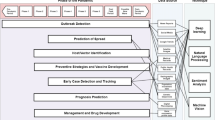Abstract
In this paper, we apply a new promising tool for pattern classification, namely, the Tsetlin Machine (TM), to the field of disease forecasting. The TM is interpretable because it is based on manipulating expressions in propositional logic, leveraging a large team of Tsetlin Automata (TA). Apart from being interpretable, this approach is attractive due to its low computational cost and its capacity to handle noise. To attack the problem of forecasting, we introduce a preprocessing method that extends the TM so that it can handle continuous input. Briefly stated, we convert continuous input into a binary representation based on thresholding. The resulting extended TM is evaluated and analyzed using an artificial dataset. The TM is further applied to forecast dengue outbreaks of all the seventeen regions in Philippines using the spatio-temporal properties of the data. Experimental results show that dengue outbreak forecasts made by the TM are more accurate than those obtained by a Support Vector Machine (SVM), Decision Trees (DTs), and several multi-layered Artificial Neural Networks (ANNs), both in terms of forecasting precision and F1-score.
Access this chapter
Tax calculation will be finalised at checkout
Purchases are for personal use only
Similar content being viewed by others
References
Granmo, O.-C.: The Tsetlin Machine - a game theoretic bandit driven approach to optimal pattern recognition with propositional logic. arXiv:1804.01508
Narendra, K.S., Thathachar, M.A.: Learning Automata: An Introduction. Courier Corporation (2012)
Berge, G.T., Granmo, O.C., Tveit, T.O., Goodwin, M., Jiao, L., Matheussen, B.V.: Using the Tsetlin Machine to learn human-interpretable rules for high-accuracy text categorization with medical applications. arXiv:1809.04547, September 2018
Ogihara, H., Fujita, Y., Hamamoto, Y., Iizuka, N., Oka, M.: Classification based on boolean algebra and its application to the prediction of recurrence of liver cancer. In: 2013 2nd IAPR Asian Conference on Pattern Recognition (ACPR), pp. 838–841. IEEE (2013)
Santa Cruz, R., Fernando, B., Cherian, A., Gould, S.: Neural algebra of classifiers. arXiv:1801.08676 (2018)
Wang, T., Rudin, C., Doshi-Velez, F., Liu, Y., Klampfl, E., MacNeille, P.: A Bayesian framework for learning rule sets for interpretable classification. J. Mach. Learn. Res. 18(1), 2357–2393 (2017)
Feldman, V.: Hardness of approximate two-level logic minimization and PAC learning with membership queries. J. Comput. Syst. Sci. 75(1), 13–26 (2009)
Klivans, A.R., Servedio, R.A.: Learning DNF in time 2\(^{\rm O(n1/3)}\). J. Comput. Syst. Sci. 68(2), 303–318 (2004)
Feldman, V.: Learning DNF expressions from fourier spectrum. In: Conference on Learning Theory, pp. 17–1 (2012)
Valiant, L.G.: A theory of the learnable. Commun. ACM 27(11), 1134–1142 (1984)
Hauser, J.R., Toubia, O., Evgeniou, T., Befurt, R., Dzyabura, D.: Disjunctions of conjunctions, cognitive simplicity, and consideration sets. J. Mark. Res. 47(3), 485–496 (2010)
Rudin, C., Letham, B., Madigan, D.: Learning theory analysis for association rules and sequential event prediction. J. Mach. Learn. Res. 14(1), 3441–3492 (2013)
McCormick, T., Rudin, C., Madigan, D.: A hierarchical model for association rule mining of sequential events: an approach to automated medical symptom prediction. Annals of Applied Statistics (2011)
Granmo, O.-C., Oommen, B.J.: Solving stochastic nonlinear resource allocation problems using a hierarchy of twofold resource allocation automata. IEEE Trans. Comput. 59, 545–560 (2010)
Oommen, B.J., Kim, S.-W., Samuel, M.T., Granmo, O.-C.: A solution to the stochastic point location problem in metalevel nonstationary environments. IEEE Trans. Syst. Man, Cybern. Part B (Cybern.) 38(2), 466–476 (2008)
Tung, B., Kleinrock, L.: Using finite state automata to produce self-optimization and self-control. IEEE Trans. Parallel Distrib. Syst. 7(4), 439–448 (1996)
Bouhmala, N., Granmo, O.-C.: Stochastic learning for SAT-encoded graph coloring problems. Int. J. Appl. Metaheuristic Comput. (IJAMC) 1(3), 1–19 (2010)
Abeyrathna, K., Granmo, O.-C., Goodwin, M.: A novel Tsetlin Automata Scheme to Forecast Dengue Outbreaks in the Philippines. In: 2018 IEEE 30th International Conference on Tools with Artificial Intelligence (ICTAI) (2018)
Gharbi, M., et al.: Time series analysis of dengue incidence in Guadeloupe, French West Indies: forecasting models using climate variables as predictors. BMC Infect. Dis. 11(1), 166 (2011)
Choudhury, Z.M., Banu, S., Islam, A.M.: Forecasting dengue incidence in Dhaka, Bangladesh: a time series analysis. Dengue Bull. 32, 29–37 (2008)
Luz, P.M., Mendes, B.V., Codeço, C.T., Struchiner, C.J., Galvani, A.P.: Time series analysis of dengue incidence in Rio de Janeiro, Brazil. Am. J. Trop. Med. Hyg. 79(6), 933–939 (2008)
Silawan, T., Singhasivanon, P., Kaewkungwal, J., Nimmanitya, S., Su-wonkerd, W.: Temporal patterns and forecast of dengue infection in Northeastern Thailand. Southeast Asian J. Trop. Med. Public Health 39(1), 90 (2008)
Promprou, S., Jaroensutasinee, M., Jaroensutasinee, K.: Forecasting dengue hemorrhagic fever cases in Southern Thailand Using ARIMA Models. Dengue Bull. 30, 99–106 (2006)
Phung, D., et al.: Identification of the prediction model for dengue incidence in Can Tho City, a Mekong Delta Area in Vietnam. Acta Trop. 141, 88–96 (2015)
Abeyrathna, K., Granmo, O.C., Goodwin, M.: Effect of data from neighbouring regions to forecast dengue incidences in different regions of philippines using artificial neural networks. Norsk Informatikkonferanse (2018)
Author information
Authors and Affiliations
Corresponding author
Editor information
Editors and Affiliations
Rights and permissions
Copyright information
© 2019 Springer Nature Switzerland AG
About this paper
Cite this paper
Abeyrathna, K.D., Granmo, OC., Zhang, X., Goodwin, M. (2019). A Scheme for Continuous Input to the Tsetlin Machine with Applications to Forecasting Disease Outbreaks. In: Wotawa, F., Friedrich, G., Pill, I., Koitz-Hristov, R., Ali, M. (eds) Advances and Trends in Artificial Intelligence. From Theory to Practice. IEA/AIE 2019. Lecture Notes in Computer Science(), vol 11606. Springer, Cham. https://doi.org/10.1007/978-3-030-22999-3_49
Download citation
DOI: https://doi.org/10.1007/978-3-030-22999-3_49
Published:
Publisher Name: Springer, Cham
Print ISBN: 978-3-030-22998-6
Online ISBN: 978-3-030-22999-3
eBook Packages: Computer ScienceComputer Science (R0)





